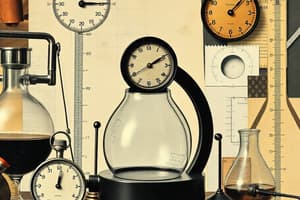Podcast
Questions and Answers
What concept refers to the distance comprehensibly covered by the instrument?
What concept refers to the distance comprehensibly covered by the instrument?
- Range (Langbiak) (correct)
- Light source
- Movement
- Material consideration
Which of the following aspects is likely to affect the instrument's performance?
Which of the following aspects is likely to affect the instrument's performance?
- Distance/length
- Material consideration (correct)
- Positive/Negative factors
- Movement
What does the term 'movement' refer to in the context of this instrument?
What does the term 'movement' refer to in the context of this instrument?
- The calibration adjustments made to the instrument
- The distance the instrument itself can travel
- The reaction of the measuring device to object interaction (correct)
- The change in material properties during measurement
Which element of the instrument indicates the potential for errors or deviations?
Which element of the instrument indicates the potential for errors or deviations?
Which feature of the instrument is likely associated with measuring wave properties?
Which feature of the instrument is likely associated with measuring wave properties?
Which step in the scientific method involves examining and interpreting data collected during an experiment?
Which step in the scientific method involves examining and interpreting data collected during an experiment?
What best describes the significance of a hypothesis in the scientific method?
What best describes the significance of a hypothesis in the scientific method?
Which step defines the specific phenomenon that is being studied in the scientific method?
Which step defines the specific phenomenon that is being studied in the scientific method?
In the context of the scientific method, what differentiates a scientific theory from a hypothesis?
In the context of the scientific method, what differentiates a scientific theory from a hypothesis?
Which step of the scientific method entails performing actions through the senses?
Which step of the scientific method entails performing actions through the senses?
Which option most accurately reflects the primary purpose of constructing a meaningful stem in a multiple choice question?
Which option most accurately reflects the primary purpose of constructing a meaningful stem in a multiple choice question?
What is a key characteristic of the options provided in a multiple choice question?
What is a key characteristic of the options provided in a multiple choice question?
Which statement about using common student misconceptions as distractors is true?
Which statement about using common student misconceptions as distractors is true?
What is an important guideline regarding the phrasing of options in a multiple choice question?
What is an important guideline regarding the phrasing of options in a multiple choice question?
Which of the following best describes the correct approach to stating the correct answer in a multiple choice question?
Which of the following best describes the correct approach to stating the correct answer in a multiple choice question?
Flashcards are hidden until you start studying
Study Notes
Instrument Description
- The instrument described has a range, likely a measuring range, that can be understood as a comprehensive distance covered
- The instrument's material properties and how they affect the instrument's performance are significant factors in the description
- The instrument's movement is described in the context of how it reacts to the measured object, mentioning movement of the object
- The instrument accounts for positive and negative factors, potentially indicating errors or deviations in measurement
- The instrument measures distance or length related to the object, potentially referencing the length of waves
- The instrument likely incorporates a light source for measurement purposes
Scientific Method Steps
- Observations involve using the five senses to gather data about the world around us
- Problem Definition involves clearly identifying the phenomenon to be investigated
- A hypothesis is a proposed explanation or solution to the problem
- Experimentation involves observing and measuring a phenomenon to test the hypothesis
- Analysis of Results involves examining and interpreting the data collected during experimentation
- Conclusions are formed based on the experimental evidence, determining if the hypothesis is supported or not
- A scientific theory is a hypothesis that has been extensively and consistently validated by empirical evidence, providing a comprehensive explanation of a phenomenon
Studying That Suits You
Use AI to generate personalized quizzes and flashcards to suit your learning preferences.



